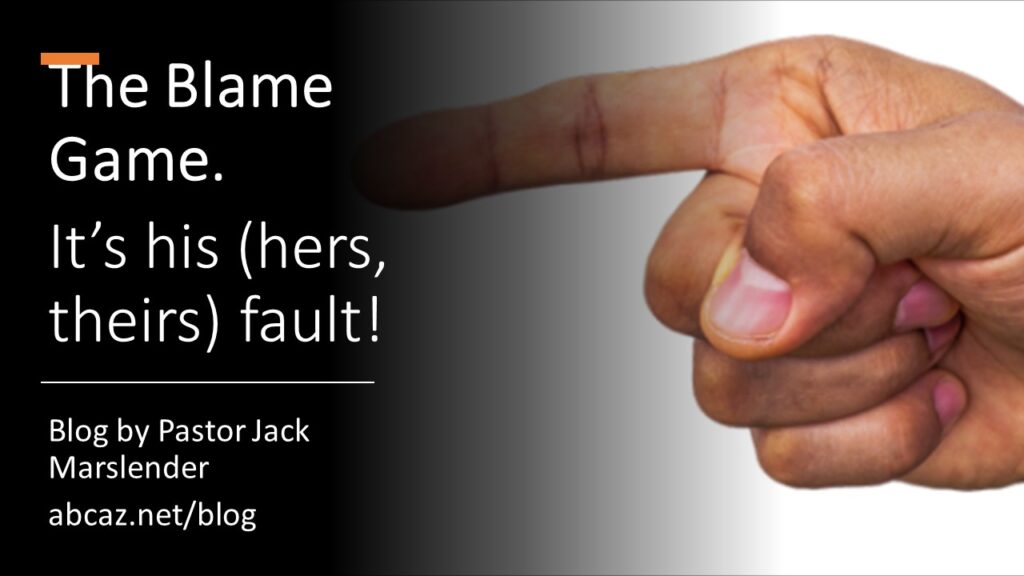
Let me start by saying that the world is broken. And there is plenty of blame to go around.
But it’s unhealthy to spend too much time playing the blame game.
Need evidence that the world is broken and messed up? Look around. Wars. Terrorists. Earthquakes. Murders. Hurricanes. Pandemics. There are tragedies everywhere. And Jesus warned us that this would be true.
But instead of us turning to the One (and the only One) who can fix things, we have far too many people playing the blame game.
It’s the President’s fault. It’s the previous President’s fault. It’s congress’s fault. It’s the governor’s fault. It’s the court’s fault. It’s California’s fault. It’s the church’s fault. It’s Democrat’s fault. It’s Republican’s fault. It’s the school board’s fault. It’s the teacher’s fault. It’s the student’s fault. It’s “X’s” fault.
It’s all around us, and you hear it everywhere. Most likely, you’ve said some of these things—or at least thought them.
Can I give you some examples? I’ve heard the situation in Afghanistan blamed on President Biden. A few seconds later, from another news source, I heard it blamed on President Trump and his policies. Someone else took it back further and blamed it on policies that were started under President Bush. And someone else blamed it on “American Nation Building Policies” over the last 100 years.
We lost at least 13 Americans in a horrible Isis attack this last week, and even before the bodies were returned to America, the blame game was in full swing, with politicians lining up to find someone (almost always in the ‘other’ party) to blame.
That number of deaths pales in comparison to the 364 people who were murdered in the first six months of this year in Chicago. And the blame game is in full swing there as well. I’ve heard those murders blamed on pro-gun people and anti-gun people and on Republicans and on Democrats and on whites and on blacks and on police and on gangs . . .. Name any group; someone has blamed them.
Hurricane Ida has just devastated parts of Louisiana and the south and inundated New York and New Jersey. The storm has just cleared and the blame game is in full swing. It is being blamed on fossil-fuel burning and on policies enacted—or not enacted—over the last 100 years. The damage and destruction will be blamed (wait for it, for it will happen) on a whole host of politicians, business interests, political parties, and federal, state, and local agencies.
I won’t even go into details on the Coronavirus, which has taken the blame game to new heights.
Instead of spending time playing the blame game, we need to approach tragedies from other angles:
Accept Biblical teaching. Jesus taught us that these things would happen, and though there is plenty of human blame to go around, the truth is that they will continue to happen. Pointing fingers at leaders we don’t like doesn’t solve anything. Finding a scape goat doesn’t change reality. Tragedies shouldn’t take us by surprise. Jesus warned us that they would come—and even intensify—in the future.
Talk to God. Instead of blaming others, learn to pray for God’s help and God’s healing. Pointing out that “Politician A” caused “X” doesn’t change reality. Praying for those hurt by “X” (and helping them ourselves when we can) does much more than angry rants.
Help the hurting. Feed the hungry instead of ranting at policy makers. House the homeless instead of pointing out the faults of politicians or an economy that makes housing hard-to-come-by. Take care of refugees instead of screaming at terrorists and broken economies. Love and comfort the grieving instead of stoking their anger. Provide temporary help for those who have lost homes due to fire or flood or earthquakes. It may feel good to scream about “100 years of failed forest management” or “the flood—or the drought—was caused by climate change,” but the rants do little to change reality and they don’t help the hurting.
Seek honest answers and wisdom that will help over the long term. Ranting does little. Honest hard work that evaluates issues, changes policy, finds solutions, and slowly (unfortunately) brings about needed change is slow and frustrating and yet makes a difference.
Some examples?
Hurricanes cause real damage and incredible human suffering. We can point fingers at policies of the past, or we can find ways to minimize future damage. How do we better design cities and building codes and drainage and levees to minimize future damage? It’s hard work—but necessary if we want to learn from failures of the past.
Forest fires have been on the increase. Instead of screaming about them, we may very well need new forest management policies, new climate policies, and new ways to minimize damage to cities and people. It is helpful to find out “what went wrong and caused this,” but too often today we stop after the blame game and never get around to the “let’s fix-it” game.
In America, we have a very definite violence issue. We can rant at “the other party and their shortsighted policies,” or we can sit down and find solutions. Admittedly, the first part is easy. The second part is tough and there aren’t any easy answers. But we need to do “tough” and never accept 364 homicides in one city in six months.
In the southwest, we have a very definite drought problem. There’s lots of blame to go around. The tough part is fixing it. How do we reduce water use? What other sources of water can we find? Yelling (at city planners, or at farmers, or at those who have lawns, or at golf courses and water parks, or at those responsible for climate change, etc.) does nothing. Instead of yelling, we need an abundance of hard work and tough discussion and some give-and-take and some hard work by all of us.
Racism is a real issue in America, but we’re spending more time blaming than fixing. “It’s the fault of the Whites,” or “It’s the fault of the Blacks (or the Hispanics or . . .) for playing the race card” has been a constant rant for as long as I’ve been around. How about engaging in some tough cross-cultural and cross-ethnic prayer meetings, discussions, and studies. How about listening to what others are saying, instead of just passing laws trying to shut people up?
The problem with the blame game (even when there is a bit of truth in it) is that it is leads to anger rather than change. It ignores the reality that war, tragedy, and brokenness will always be with us. It shallowly implies that “If ‘X’ had not done ‘Y,’ then all would be well.
The world is broken. Playing the blame game won’t fix it, so let’s move beyond that.
We need to accept that tragedies and issues are part of life on a broken planet. We need to pray to the only One who can really change things. We need to be at work helping those who have been hurt. And we need to do the hard work of seeking answers rather than yelling, ranting, screaming, and playing the blame game.
The blame game is easy and even fun to play.
But it accomplishes nothing.
As believers in Jesus, we have work to do. And screaming, ranting, yelling, and pointing fingers is not part of that.
